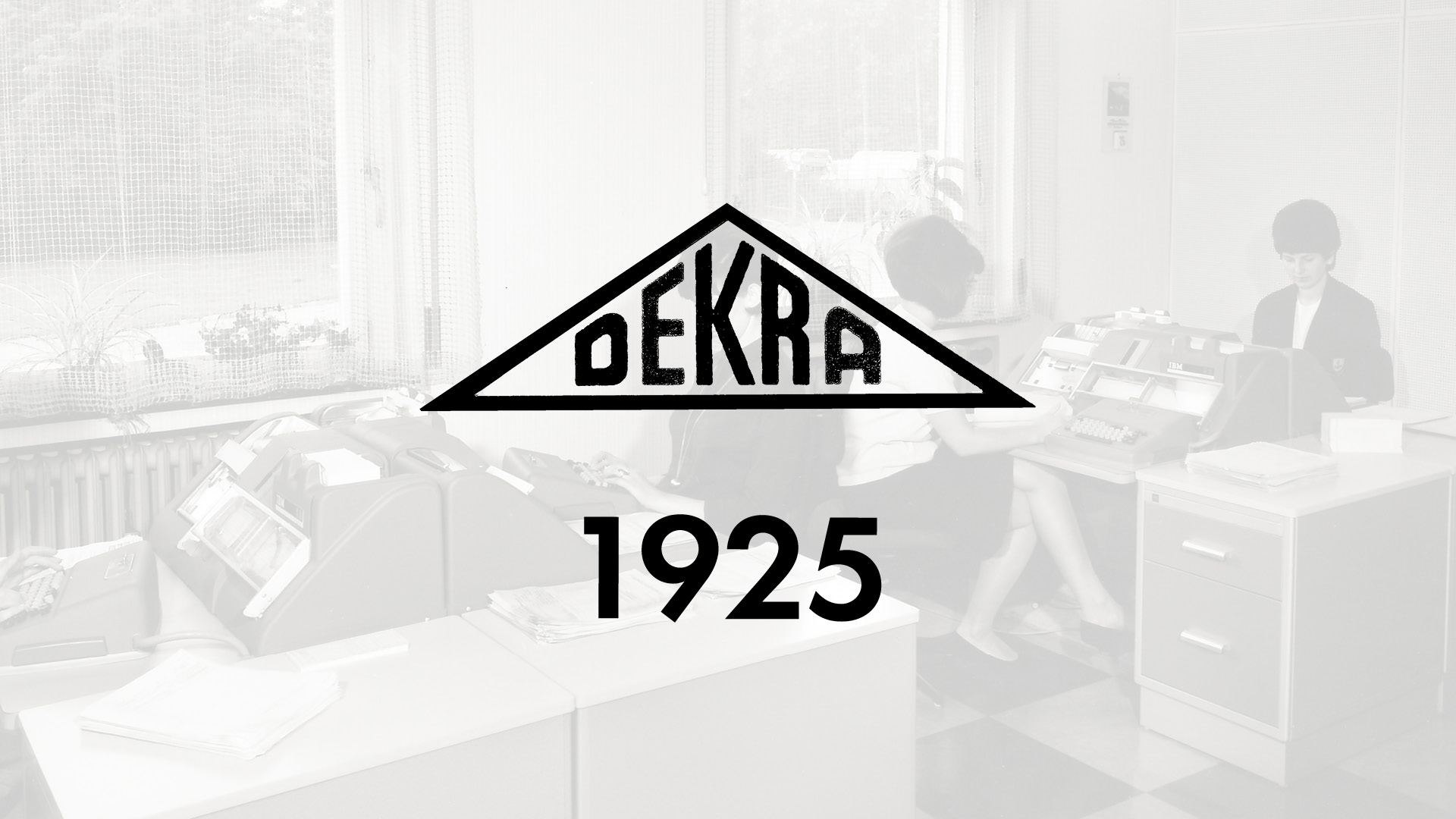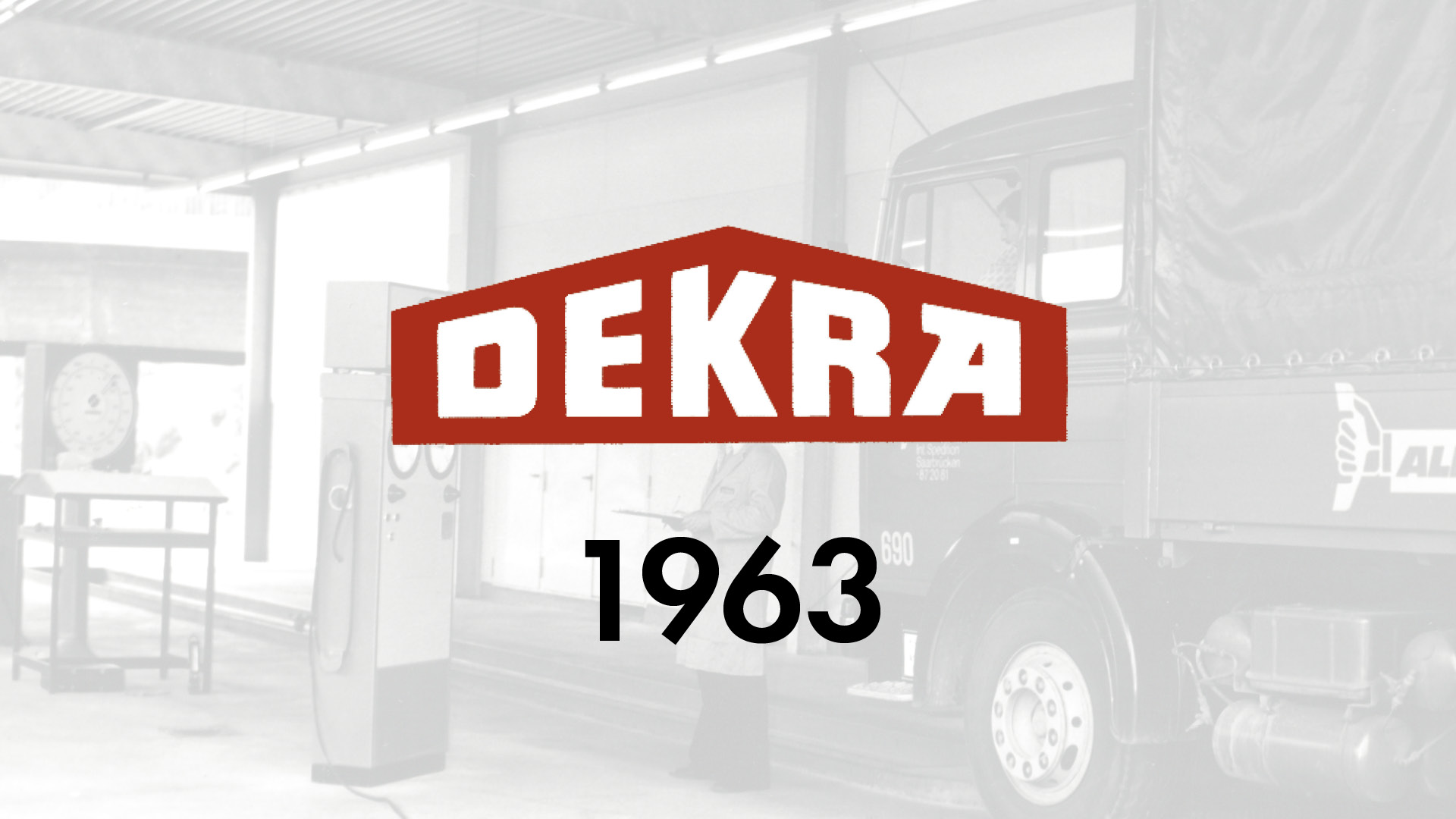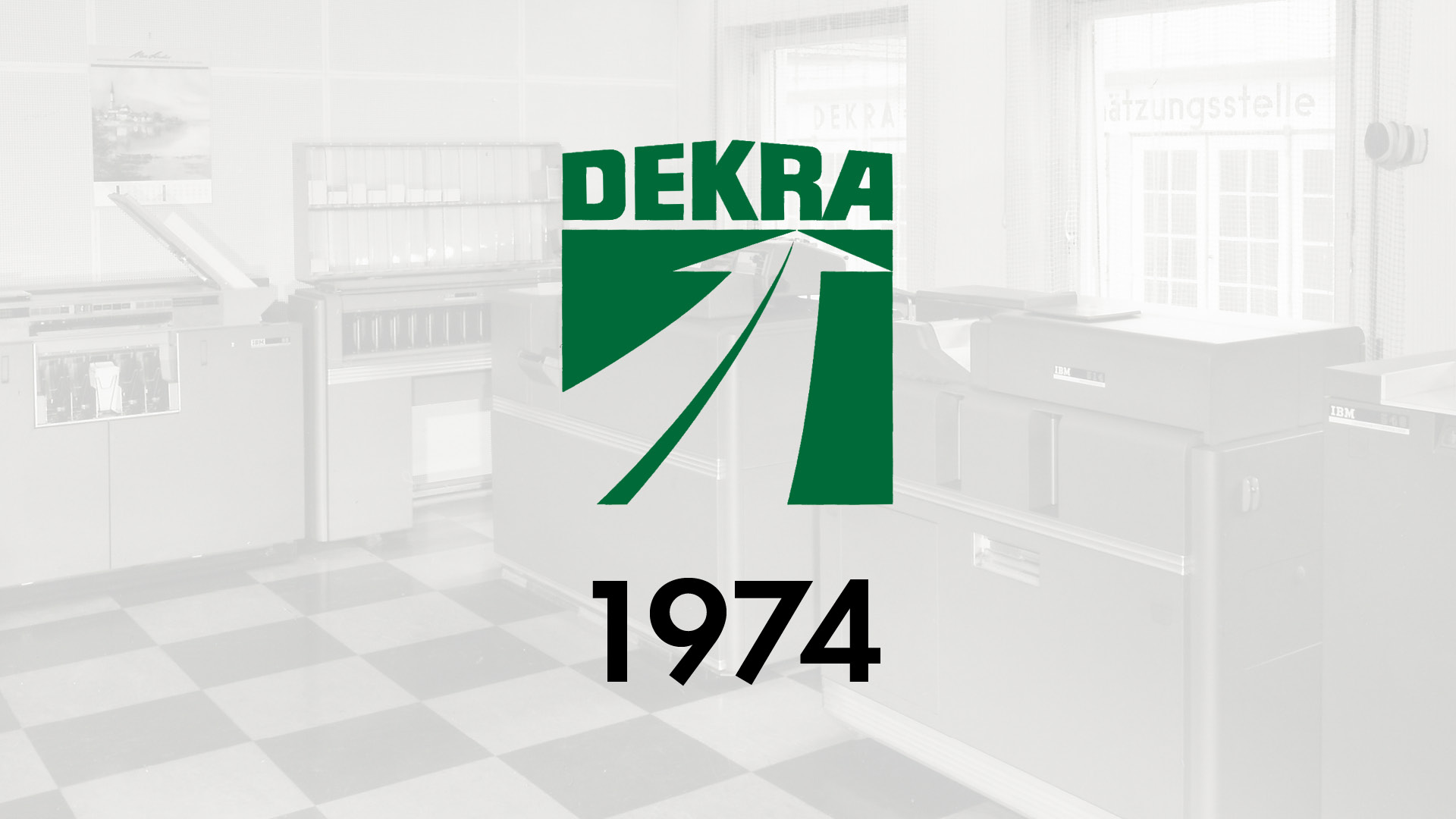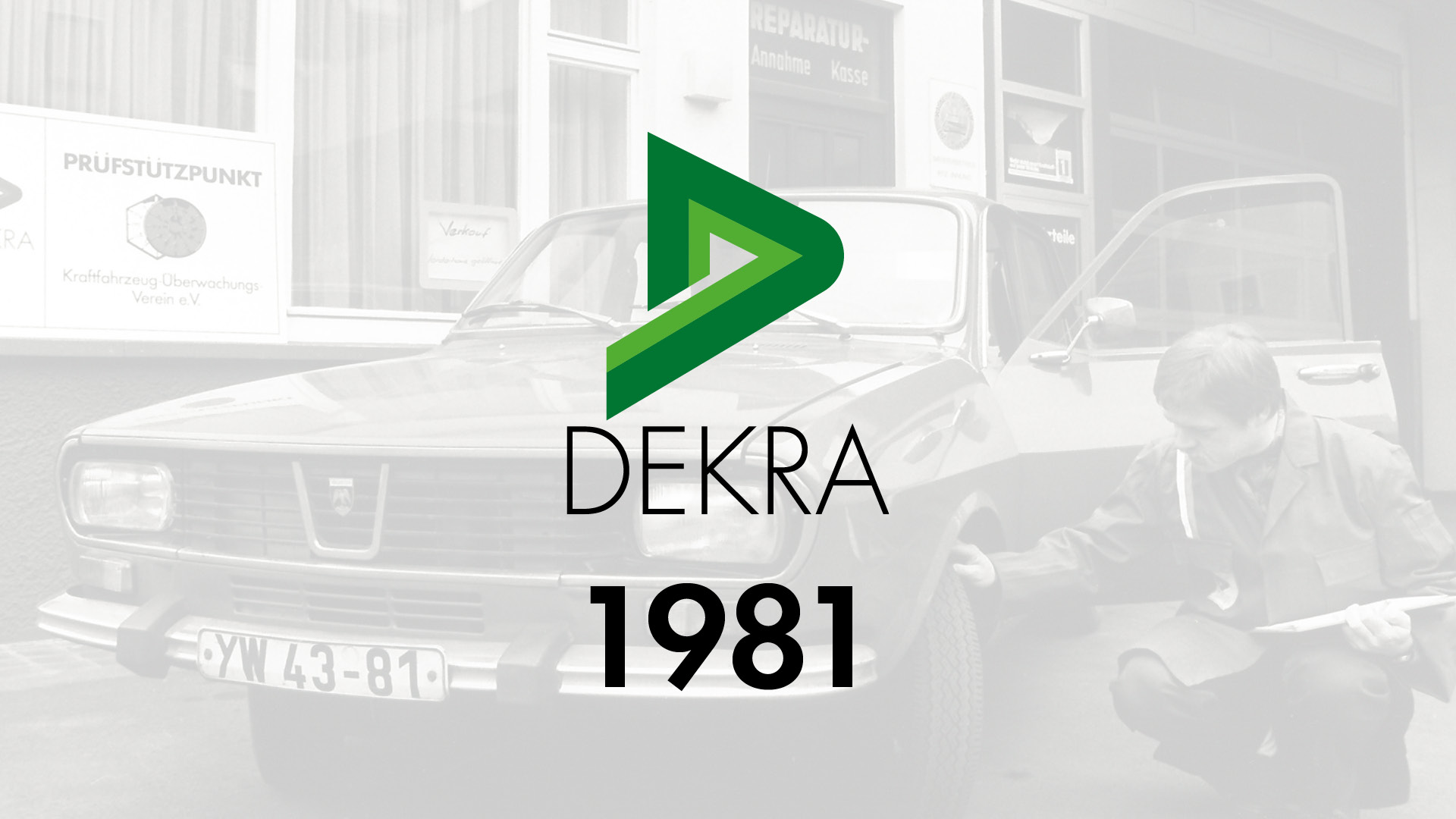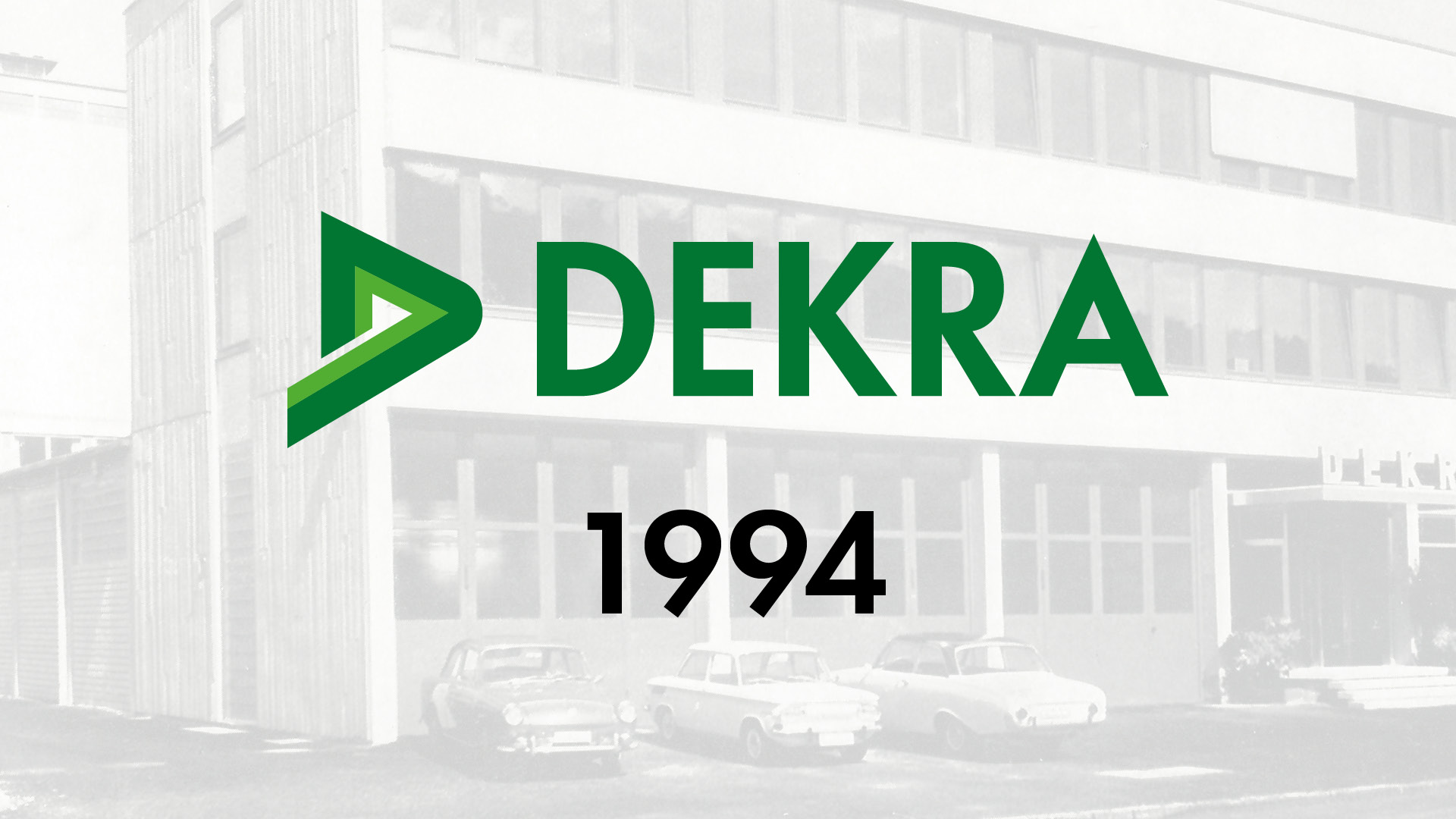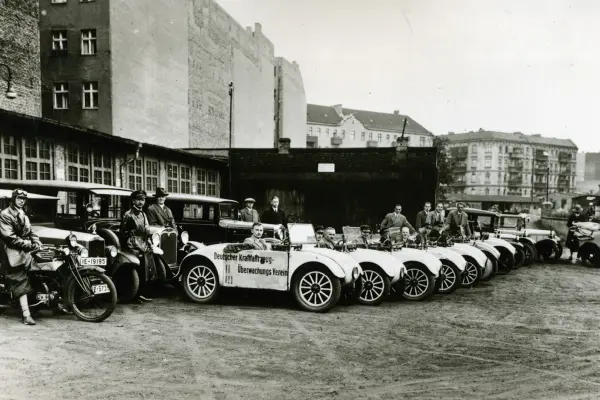
Since 1925

Since 1925
Our History
The history of DEKRA starts with the automobile: The Deutsche Kraftfahrzeug-Überwachungs-Verein e.V. (German Motor Vehicle Monitoring Association) was founded in 1925 in Berlin. DEKRA has been ensuring safety ever since. At first, attention was focused on technical safety – primarily in the automotive sector. Now, as the largest unlisted expert organization, DEKRA has expanded its activities into many diverse aspects of daily life “on the road, at work, and at home”. In addition to analog functional safety, DEKRA is also fully committed to digital security in a networked world – on five continents. This is because there is no limit to safety. Learn more about the history of DEKRA and the most important milestones of the past years in the interactive timeline.
1925–1929
In 1924, the industrialist Hugo Stinnes develops the idea of a voluntary technical monitoring service for motor vehicles. The idea is realized on June 30, 1925 with the founding of the Deutsche Kraftfahrzeug-Überwachungs-Verein (German Motor Vehicle Monitoring Association) in Berlin. The objective of the association is to support its members, such as freight forwarders, with all the information they need concerning automobiles. Stinnes is not able to see his idea implemented any further – he died in April 1924. DEKRA’s first services include technical tests and advice for members. First appraisals for courts and insurance companies are also drawn up at this early stage.
1930–1935
In 1930, DEKRA is already operating 79 inspection centers and 52 valuation centers to determine the estimated value of vehicles. After the National Socialists come to power in 1933, DEKRA follows a consciously neutral course with regard to the National Socialist state and the Nazi Party under the management of Dr. Kurt Möhring.
1936–1938
From 1936, DEKRA can no longer maintain its neutral course with regard to the National Socialist regime and is forced to organize itself within the state-controlled trade association “Reichsverkehrsgruppe Kraftfahrgewerbe” (Reich Transport Group for the Motor Vehicle Industry). In 1938, Section 29 is introduced in the Road Traffic Licensing Regulations: Registration offices can summon vehicles for testing – especially with regard to their suitability for war.
1939–1945
In World War II, the majority of DEKRA engineers are drafted into the Wehrmacht (German Armed Forces). Starting in 1942, the focal point of orders shifts from vehicle inspection to damage and time estimates.
1946–1953
After World War II, former DEKRA engineers resume the company's work in 1946. Stuttgart becomes the new location of the head office. After the introduction of the main vehicle inspection in 1951, DEKRA seeks recognition as an “other body” (an institution that itself is not an authority in the administrative sense, but is legally authorized to play a part in the implementation of laws and in the provision of public services). This recognition is granted in 1953. Four years later, DEKRA achieves “expanded recognition”, exempting DEKRA members from the obligation to submit to an inspection by an officially recognized expert.
1954–1959
In 1954, DEKRA initiates the “work circle for large fleet owners” to provide more fleet safety and efficiency. In the same year, the DEKRA accident appraisal department starts its work. Experts are able to build upon the expertise from long-standing work in the field of appraisals and valuations of vehicles. In 1956, the DEKRA head office in Stuttgart receives its own administrative building in Heinrich-Baumann-Straße 1-3. A year later and with 60 employees, DEKRA’s sales exceed the one-million mark.
1960–1964
In 1960, a revised version of Section 29 of the Road Traffic Licensing Regulations comes into force: The official inspection sticker to be placed on the license plate is introduced. DEKRA members receive the sticker directly from DEKRA. With the recognition of DEKRA as a monitoring organization, DEKRA experts have also been working as officially recognized experts since 1961, and main vehicle inspections at DEKRA are open to everyone. In 1964, the first IT system, an IBM 421, goes into service at DEKRA.
1965–1969
The press and publicity department is established in 1965 and a year later, publishes the first issue of the employee magazine “oho”. DEKRA driver support has been offering further training for professional drivers since 1967. In 1968, accident appraisals are prepared using IT for the first time. In the same year, DEKRA sales reach 12 million with 355 employees.
1970–1975
As from 1973, the magazine “ATV. Auto, Technik, Verkehr” (car, technology, traffic) provides information to DEKRA members. In the same year, a job description is created for professional drivers and DEKRA begins training drivers. In 1974, the DEKRA Akademie is created in Wart as a training center for the increasing number and range of training and professional development activities. The DEKRA head office in Stuttgart also continues to grow steadily: In 1975, construction work begins on a new main administrative building in Schulze-Delitzsch-Straße in Stuttgart-Vaihingen.
1976–1979
In 1978, the accident research department is established. The work of the experts builds on the accident appraisals and includes a database for evaluating traffic accidents and carrying out crash tests. In 1978, an agreement with BMW allows DEKRA engineers to perform vehicle inspections directly in the automobile manufacturer's contracted workshops. The company's own network of inspection centers is also further expanded: In 1979, DEKRA has 51 inspection centers throughout the Federal Republic of Germany.
1980–1985
In 1980, DEKRA becomes an accredited “inspection center for device safety”. In addition to vehicle inspections, the most important area of work is appraisals. In 1981, DEKRA membership reaches a record high of over 59,000 members. In 1984, DEKRA offers inspection and appraisal services in 10,000 partner workshops. Since 1985, DEKRA experts have also been inspecting the safety of children's playgrounds.
1986–1989
With DEKRA France SAS, DEKRA offers vehicle inspections in a neighboring European country for the first time, starting in 1988. In 1989, DEKRA becomes involved in the German Touring Car Championship and, from the very beginning, DEKRA technical inspectors ensure vehicle safety. In the same year, as a future study, the Eurotruck demonstrates technical possibilities such as distance sensors and travels through Europe as an ambassador for DEKRA. In 1989, with 3,000 employees and 62 branches, DEKRA has annual sales of 441 million Deutschmarks and has grown into a large service company. While still working under the government of East Germany, DEKRA is commissioned to perform the services of the Kraftfahrzeugtechnische Amt (Motor Transport Authority – KTA), including vehicle inspections and driver's license tests.
1990–1994
In 1990, the newly established DEKRA AG takes over the operative business of DEKRA e.V. 27 new DEKRA branches are established in the new German states. A year later, DEKRA ETS expands DEKRA’s portfolio to include quality management, technical safety, material testing, and construction. The crash center in Neumünster offers new opportunities for DEKRA research in the field of road safety. In 1993, DEKRA sponsors Michael Schumacher and the DEKRA logo appears across all media. In the same year, DEKRA Umwelt launches various environmental protection services, such as the measuring of air emissions or advice on occupational safety, and is involved in the privatization of vehicle monitoring in the Czech Republic. A year later, this involvement is supplemented by additional DEKRA investments across Europe in Poland and Russia. In 1994, Group sales are more than one billion Deutschmarks. The main sales drivers are vehicle inspections, appraisals, and training services.
1995–1999
Since 1996, DEKRA services have included the certification of products and quality management systems. Since 1997, DEKRA has been present in Italy and Hungary. In 1998, claims settlement companies that had so far operated independently throughout Europe are combined as part of the DEKRA claims settlement network. By the end of the 1990s, DEKRA companies are present in most EU countries – with vehicle inspections, as well as appraisals, claims settlement, and quality assurance. DEKRA is also active in the future market of the Internet with the FairCar automobile marketplace.
2000–2004
Since 2000, DEKRA Arbeit has been helping companies and employees find each other. DEKRA Industrial is established one year later. On 2003, DEKRA opens its Technology Center at the EuroSpeedway in Lausitz with a state-of-the-art measuring and testing laboratory. In the same year, DEKRA and the German Football Association (DFB) sign an agreement to sponsor referees in the Bundesliga. DEKRA has been sponsoring the Formula 1 racing driver Nico Hülkenberg since 2004.
2005–2009
With the acquisition of NORISKO in 2005, DEKRA expands its industrial inspection services significantly. The magazine for DEKRA members “ATV. Auto, Technik, Verkehr” becomes “trans aktuell”. Since 2007, a new DEKRA seal combines all the existing DEKRA quality marks and has represented a distinctive quality mark since then that is used to distinguish companies and products that verifiably meet defined standards in terms of safety, quality, and sustainability, for example. In 2009, the Brazilian appraisals specialist Volchi is acquired by DEKRA. DEKRA also acquires KEMA Quality with its headquarters in the Netherlands, a global player in product testing and certifications.
2010–2014
In 2010, DEKRA AG takes on the legal form of “Societas Europaea” (SE), which is given to European public companies. One year later, DEKRA opens its Asian headquarters in Shanghai. In 2013, DEKRA expands its vehicle inspection business internationally and acquires shares in the New Zealand market leader Vehicle Testing New Zealand (VTNZ). In South Africa, DEKRA boosts its industrial business offering by buying Raysonics, the market leader for non-destructive material testing. In 2014, DEKRA extends its services for the rail sector with the purchase of the Netherlands-based Plurel B.V.
2015
In 2015, DEKRA celebrates its 90th anniversary with a vision for the next ten years to become the global partner for a safe world in the three aspects of life “on the road, at work, and at home”. With the takeover of the QuieTek Corporation in Taipei (Taiwan), DEKRA expands its portfolio in 2015 and strengthens its position as a provider of testing services for electronic products and components. With the takeover, DEKRA completes its range of testing services for wireless communication and electromagnetic compatibility (EMC). Both are key competencies for the future trends of Industry 4.0 and Automotive 4.0.
2016–2017
In the greater Lisbon area, DEKRA opens the first vehicle inspection station in Portugal in 2016. A year later, a new laboratory for the testing of automotive parts and components is put into operation in Hsinchu (Taiwan). DEKRA signs the purchase contract for the Lausitzring in 2017. Together with the DEKRA Technology Center in Klettwitz, an innovation center for testing the mobility of the future is created there.
2018–2019
In 2018, DEKRA Digital GmbH is established with the goal of developing data-driven business models that will enhance safety through the use of digital technologies in everyday life. In Shanghai, DEKRA opens a laboratory to monitor hazards arising from chemical reactions and the DEKRA test laboratory in Málaga is authorized to provide certification services in the areas of smart home and building automation. At the beginning of 2019, the expert organization DEKRA reorganizes its business: The global range of services is grouped into eight Service Divisions and eight regions. In 2019, DEKRA enters the vehicle inspection market in China and Chile. In the same year, DEKRA is accredited as a calibration laboratory for measuring devices in the automotive engineering sector. By cooperating with Argus Cyber Security, DEKRA strengthens its position in this safety-critical sector. At the same time, DEKRA boosts its commitment to ensuring utmost safety for two-wheeled e-mobility by opening a new testing laboratory at the main Stuttgart site for testing electromagnetic compatibility (EMC). It features testing equipment for e-bike batteries.
2020-2021
At the onset of the 2020 COVID-19 pandemic, DEKRA expands its leading position in the testing and certification of personal protective equipment. The DEKRA Testing & Certification laboratory in Essen tests surgical masks on the basis of a recognized rapid test. In the same year, DEKRA expands its cybersecurity portfolio to include Internet of Things (IoT) testing equipment in accordance with ioXt Alliance standards. With the completion of its services in noise measurement, DEKRA becomes a Notified Body for the acoustic testing of machinery and equipment at the end of 2020. In 2021, DEKRA audit experts monitor the safety, health and operation of COVID test stations in Baden-Württemberg. In August 2021, DEKRA is recognized as a Technical Service for Cybersecurity and Software Updates in the automotive sector.
2022
In 2022, DEKRA is awarded a platinum medal for the second time in a row by EcoVadis, the most important international sustainability standard in global value chains. Starting in April 2022, DEKRA checks video surveillance for its compliance with the legal requirements of the General Data Protection Regulation (GDPR) and the German Federal Data Protection Act (BDSG). In July 2022, DEKRA opens the first vehicle inspection station in Spain. Starting in September 2022, DEKRA manages the nationwide vehicle inspection program in Costa Rica. In cooperation with Microsoft, DEKRA advances digital safety in the transport sector and the work environment based on Microsoft Azure Cloud. By the end of 2022, DEKRA offers its corporate customers throughout Germany an internationally patented procedure for checking the battery condition of used electric vehicles.
2023
In 2023, DEKRA will continue to invest heavily in future fields such as artificial intelligence, cyber security, mobility of the future and sustainability. In June, DEKRA launches its first testing and certification services for AI to ensure the safety and reliability of AI-based products and services. Since August, DEKRA and AIShield, a Bosch start-up, have been pooling their expertise in a strategic partnership. The aim is to combine DEKRA's expertise in testing and certification with AIShield's solutions in the field of cyber security for AI systems. In collaboration with LatticeFlow AI, DEKRA is conducting the first commercial AI assessment for Migros Bank, one of Switzerland's most renowned financial institutions. Europe's largest manufacturer-independent testing facility for driver assistance functions is built at the DEKRA Lausitzring in Klettwitz. DEKRA also supports the start-up hylane, which operates the largest hydrogen truck fleet in Europe.
2024
Since March 2024, DEKRA has been authorised in Saudi Arabia to award the Saudi Quality Mark (SQM), which is important for numerous product categories. In May 2024, DEKRA will open a Wi-Fi Alliance®-authorised test laboratory in Stuttgart, thereby expanding its network of authorised laboratories in Málaga (Spain), Guangzhou (China) and Taiwan. By laying the foundation stone for a new battery testing and certification laboratory in Klettwitz, DEKRA is taking another step towards becoming the world's largest independent testing centre for the mobility of tomorrow. DEKRA will also serve as the official referee partner for the Women's and Men's Handball World Championships until at least 2027.
2025
100 years after its founding, DEKRA still stands for vehicle safety, while at the same time expanding its global presence and developing new services in the areas of future mobility, sustainability, cybersecurity, and artificial intelligence. DEKRA's goal remains unchanged: to make the world safer and more sustainable. In 2025, DEKRA will introduce a new service, the ‘Digital Trust Service,’ which offers a unique, integrated solution. It enables customers to bring product innovations to market faster while effectively minimising safety risks. For the first time, three essential safety aspects – functional safety, cybersecurity, and AI – will be bundled in a single testing and certification process.
Development of the DEKRA logo
The company founded in Berlin as the “Deutsche Kraftfahrzeug-Überwachungs-Verein” (German Motor Vehicle Monitoring Association) on June 30, 1925 is soon referred to simply as “DEKRA” in everyday life, and the first logo with this abbreviation follows quickly. The logo evolves from lettering in a triangle, to a trailblazing road, through to today's trademark with claim. Even though the shape and color varied at the beginning, the logo has been an important distinguishing mark on the path from automotive inspection service provider to becoming one of the world's leading expert organizations. Due to increasing internationalization, a uniform one-brand strategy is being used across the globe; together with the logo, this contributes to a strong brand.
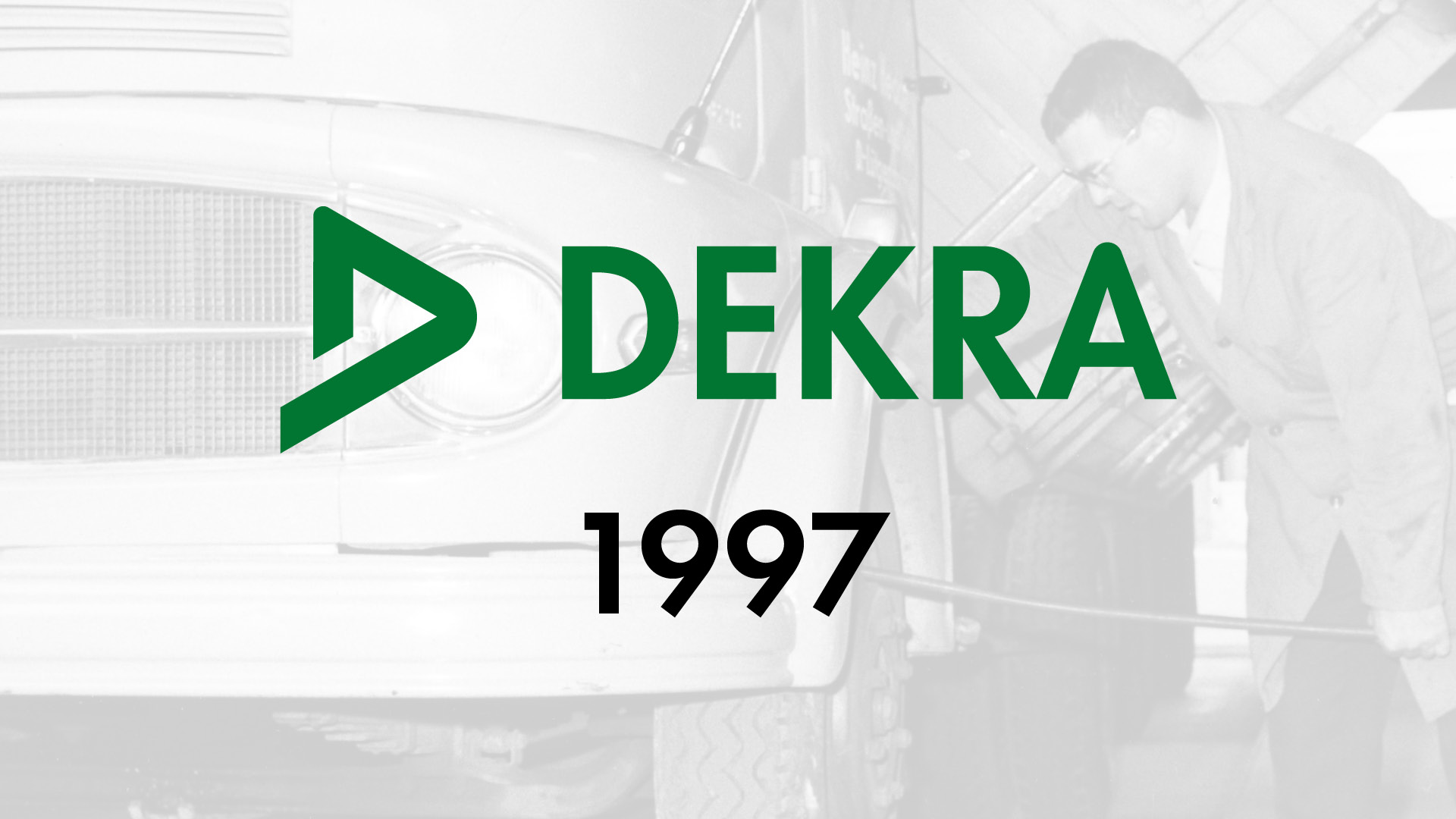
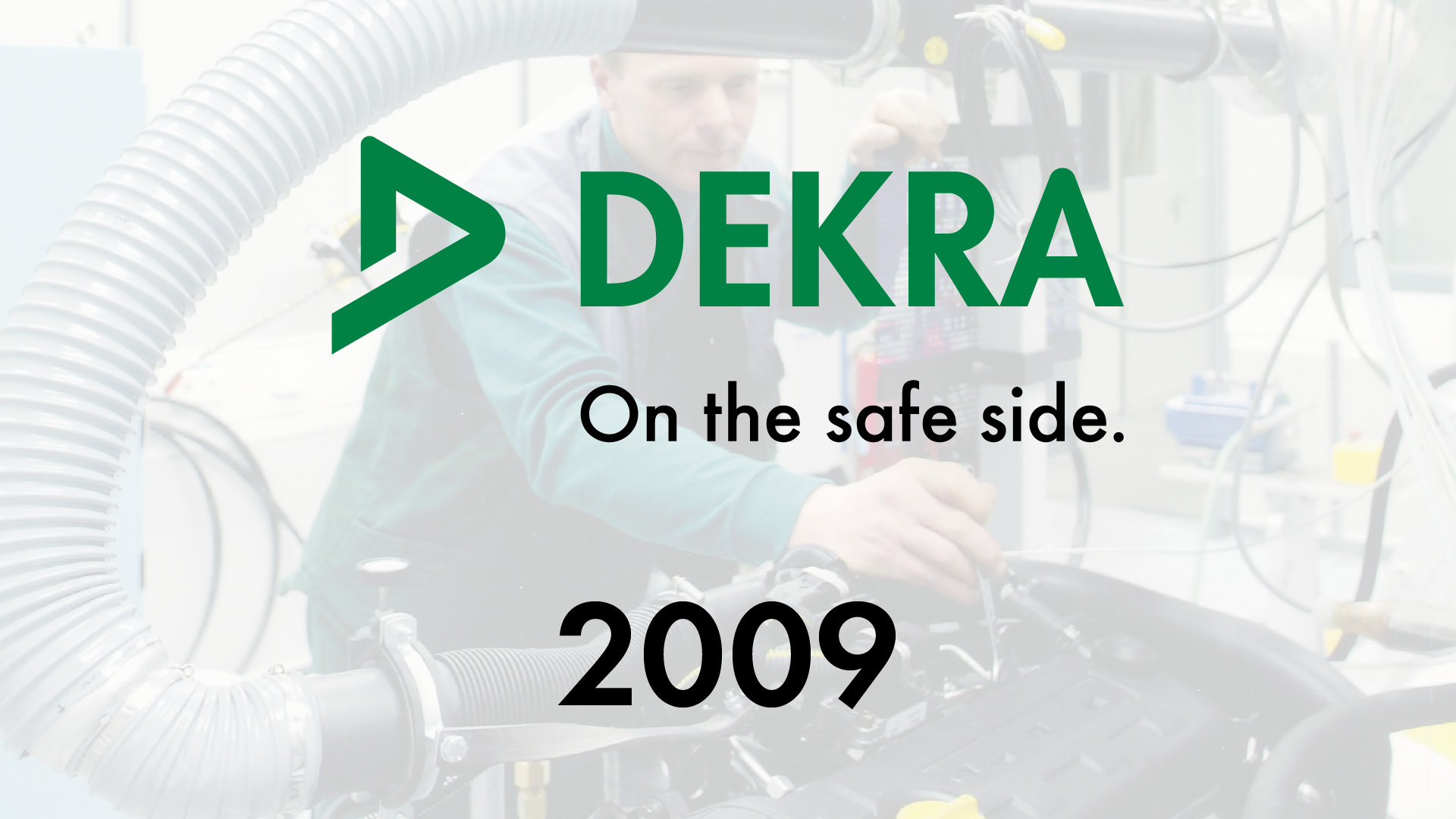
Experience our 100-year history and read about interesting moments on our chronicle website.
To the chronicle
